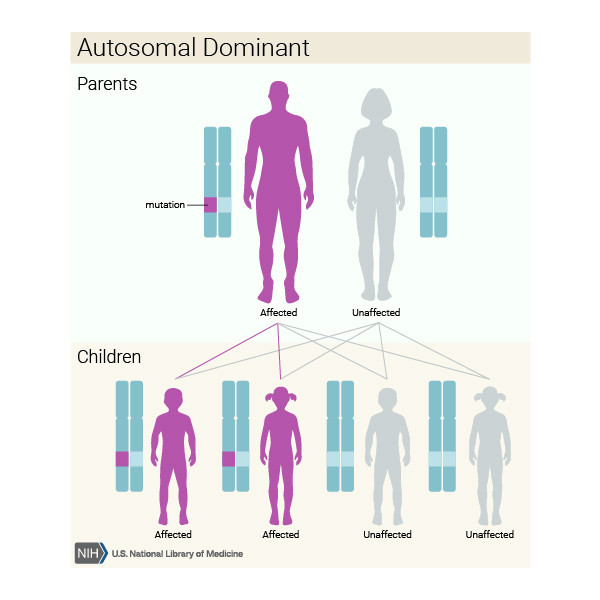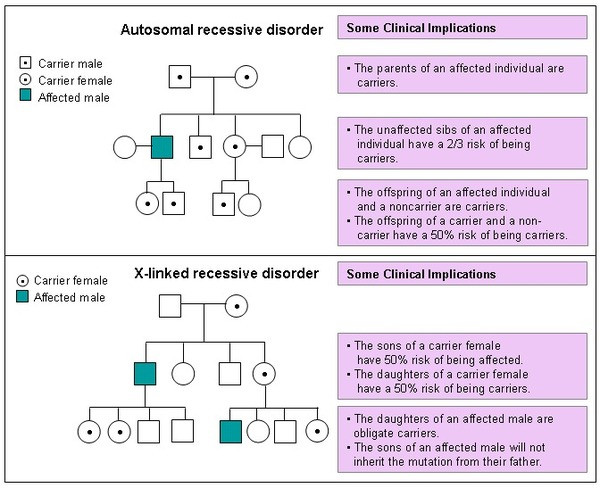Familial Mediterranean Fever (FMF) is a genetic disorder primarily characterized by recurrent fevers and inflammation. Understanding how FMF is passed down through families is crucial for those affected and their relatives. This condition is typically inherited in an autosomal recessive pattern, meaning that for a person to develop FMF, they usually need to inherit two copies of a mutated gene, one from each parent.
In autosomal recessive inheritance, both parents are often carriers of the altered gene but do not exhibit symptoms of Familial Mediterranean Fever themselves. Each of their children has a chance of inheriting two copies of the mutated gene and developing the condition, inheriting one mutated copy and becoming a carrier like their parents, or inheriting two normal copies of the gene. The gene primarily associated with FMF is called MEFV. In these cases, both copies of the MEFV gene in an individual’s cells have variations that lead to the condition.
 Autosomal recessive inheritance pattern for Familial Mediterranean Fever showing both parents as carriers of a MEFV gene variant and the child inheriting the condition.
Autosomal recessive inheritance pattern for Familial Mediterranean Fever showing both parents as carriers of a MEFV gene variant and the child inheriting the condition.
Interestingly, research indicates that approximately one-third of individuals diagnosed with Familial Mediterranean Fever possess only a single identifiable variant in their MEFV gene through standard genetic testing. Most experts believe that in these instances, a second, yet undetected, variant exists elsewhere within the gene. This highlights the complexity of genetic testing and the potential for variations that are not easily identified with current methods.
While typically autosomal recessive, Familial Mediterranean Fever can, in rare instances, appear to be inherited in an autosomal dominant pattern. In autosomal dominant inheritance, only one copy of a changed gene in each cell is enough to cause the disorder. In such cases, an affected person often inherits the gene variant from just one affected parent.
 Autosomal dominant inheritance pattern in Familial Mediterranean Fever depicting an affected parent passing a MEFV gene variant to their child.
Autosomal dominant inheritance pattern in Familial Mediterranean Fever depicting an affected parent passing a MEFV gene variant to their child.
However, some cases initially perceived as autosomal dominant inheritance of Familial Mediterranean Fever are believed to be explained by another mechanism known as pseudodominance. This occurs when a gene variant is common within a population. If one parent has Familial Mediterranean Fever (meaning they have two variants in their MEFV genes) and the other parent is a carrier (possessing one MEFV gene variant), their child might inherit FMF in a way that appears to be autosomal dominant.
 Carrier status for autosomal recessive genetic disorders like Familial Mediterranean Fever, illustrating one copy of the MEFV gene variant.
Carrier status for autosomal recessive genetic disorders like Familial Mediterranean Fever, illustrating one copy of the MEFV gene variant.
This happens because the child could inherit the affected gene from the parent with FMF and the variant gene from the carrier parent. This situation, where autosomal recessive inheritance mimics an autosomal dominant pattern, is termed pseudodominance. Understanding these different inheritance patterns is vital for genetic counseling and for families affected by Familial Mediterranean Fever.

